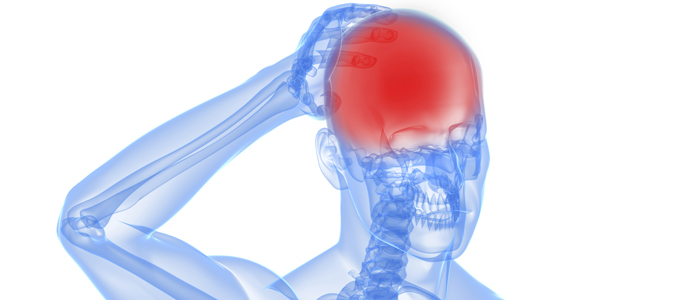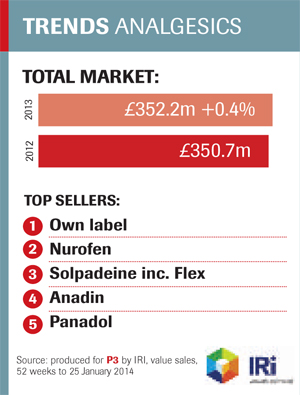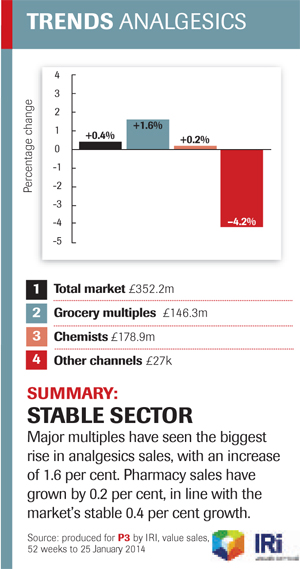Just a headache?
In OTC
Follow this topic
Bookmark
Record learning outcomes
Each day 190,000 people have a migraine attack, and almost all of us experience occasional headaches. Pharmacy staff can play a vital role in helping sufferers identify their triggers and ensure they’re getting the most from their medication
Migraine affects one in seven people in the UK and each year 25 million days are lost from work or school because of the condition. The problem can have a serious impact on all aspects of a suffer’s life, with 30 per cent saying that it has made holding down a job difficult and 50 per cent feeling that they miss out on normal family life, according to research by Migraine Action.

Migraine is more prevalent than diabetes, epilepsy and asthma combined. However, the condition remains under-diagnosed and under- treated in at least 50 per cent of sufferers.
Is it migraine?
Pharmacy staff can play an important role in spotting migraine sufferers. Often pharmacy staff are the first healthcare professionals that a migraineur may speak to about their symptoms, says Joanna Hamilton-Colclough, director of Migraine Action.
‘The individual may not know they are even affected by migraine, but may be coming into the pharmacy regularly for OTC medication for their headache. As there are many different headache types, the most important thing is for pharmacy staff to discuss symptoms and frequency of headache with the customer.’
There is no test for migraine, so diagnosis depends on the story and pattern of attacks, she Says. ‘About two-thirds of migraineurs are women and there is a genetic link so there is likely to be a family history. A discussion about what medication the customer is currently taking is important as many migraineurs have been self- medicating for a considerable period and it’s easy to get into a cycle of medication-overuse headache.’
 She comments that many sufferers don’t seek help because they mistakenly believe little can be done for them. ‘We certainly find on our helpline that people who have been told many years previously that there is little that can be done have not gone back to the pharmacy or GP and believe this still is the case, with no knowledge of the availability of triptans, forexample,’ she says.
She comments that many sufferers don’t seek help because they mistakenly believe little can be done for them. ‘We certainly find on our helpline that people who have been told many years previously that there is little that can be done have not gone back to the pharmacy or GP and believe this still is the case, with no knowledge of the availability of triptans, forexample,’ she says.
While many migraine sufferers are very informed about their condition, it is always worth testing their level of knowledge and what treatments they have tried in the past.
Headache or migraine? Before you can advise on the right treatment, you need to establish whether your customer has migraine or a headache.
- Migraine: moderate-severe headache lasting four to 72 hours, usually on one side only. During an attack customers will notice one or more of these symptoms: nausea/vomiting, photophobia, phonophobia. In one in 10 cases patients have a warning ‘aura’ before the headache, typically visual disturbance, numbness, pins and needles, ringing in ears.
- Headache: not usually accompanied by other symptoms. There are several main types of headache: tension, cluster, medication overuse, sinus and eyestrain. Ask questions about frequency, level of pain, lifestyle factors and medication use to find out which your customer has.
More from medication
Professional advice should be provided for with every Pharmacy product sold ‘whether asked for or not’, says Lynne Armstrong, Numark’s director of marketing. ‘Pharmacists and their team play an important role in helping customers manage their pain more effectively by recognising repeat purchasers and discussing whether the treatment they are taking is appropriate. Advice on identifying the causes and better management of the patient’s pain will help create customer loyalty,’ she says.
 Ms Hamilton-Colclough agrees that pharmacy staff are well placed to recognise and advise migraine sufferers on pain relief. ‘As many migraineurs have lived with their condition for many years, it is easy to fall into a pattern of taking medication out of habit rather than reviewing if it is still meeting their needs or if there may be a better option. If time is taken to question their migraine experience and management, this may quickly become apparent. Migraines are likely to change over time and therefore the help and treatment they need is likely to change.’
Ms Hamilton-Colclough agrees that pharmacy staff are well placed to recognise and advise migraine sufferers on pain relief. ‘As many migraineurs have lived with their condition for many years, it is easy to fall into a pattern of taking medication out of habit rather than reviewing if it is still meeting their needs or if there may be a better option. If time is taken to question their migraine experience and management, this may quickly become apparent. Migraines are likely to change over time and therefore the help and treatment they need is likely to change.’
Often patients won’t be taking the right dose, preferring little and often, which can lead to medication-overuse headache. ‘Simple advice, such as taking medication as early as possible during the attack and taking tablets with fizzy water to aid absorption can make a difference. Pharmacy staff should be encouraging customers to seek advice from their GP if their current medication does not seem to be giving enough relief or their migraines are more frequent than two or three a month as preventive medication may be required,’ says Ms Hamilton-Colclough.
Solpadeine’s marketing manager Louise White says that training is readily available for pharmacy teams to keep up to date. ‘We know that some patients are dissatisfied with their current pain relief – both format and active ingredients – therefore it’s vital pharmacy teams feel confident to give advice and make recommendations. To refresh knowledge on options available, Solpadeine provides free online training modules which cover pain relief and advice [at www.omegapharmatraining.co.uk.]
Headache update
Pharmacists need extra training to ensure they are able to talk to customers about the dangers of medication misuse, which can cause a daily withdrawal headache, says NICE in its latest Quality Standard on headache disorders: ‘Headaches in young people and adults’. The guidance recommends that people with migraine should be advised to take combination therapy with a triptan and either a NSAID or paracetamol. In addition, raising public and professional awareness of headaches could increase the number of people consulting healthcare professionals, leading to an increase in accurate diagnoses an appropriate treatment and prevention of headaches.
Omega Pharma is investing £4 million in a campaign to help pharmacy staff provide the right pain relief advice to customers. This is backed by the return of Solpadeine to primetime TV, with adverts that aim to raise awareness of the importance of selecting the correct pain relief. The advert also highlights the fact that Solpadeine Plus Soluble tablets work twice as fast as ordinary paracetamol. Training booklets and online tools are also available.
NICE has backed a new specialist remedy for migraine called TMS (transcranial magnetic stimulation). The handheld device sends magnetic pulses to the brain to prevent or treat migraine. In a controlled trial TMS produced 39 per cent pain- free levels after two hours. In another study, three- quarters of patients had a reduction in migraine frequency following treatment.
The TMS technique is practised by specialist migraine clinics.
Migraine self-help tips
- Avoid triggers
- Eat regularly, avoid sugary snacks and include slow-release carbohydrates
- Drink plenty of water
- Limit caffeine and alcohol ✧ Maintain a regular sleep pattern
- Take regular exercise ✧ Ensure ventilation is good indoors
- Avoid strong perfumes
- Avoid bright, flashing or flickering lights and reflective surfaces
- Wear sunglasses in bright sunshine
- Take care with posture.
Â
Category management
‘The P analgesics category represents about 40 per cent of the total P medicines category. This lends itself perfectly to facilitating an intervention between patient and pharmacy staff, something you just can’t get from supermarkets. Eight ‘migraine specific’ products rank within Numark’s top 300 selling products in independents, all are P medicines,’ says Ms Armstrong.
‘Pharmacists should ensure the fixture is in a prominent position, with signpost brands clearly visible. Merchandise by brand and segment by active ingredient to help customers navigate shelves with ease. Make the most of cross- purchasing opportunities by positioning othe elevant categories next to the headache and pain relief category, for example cold and flu, sleep and stress,’ says Ms White.
‘The range should include first-line single active ingredients as well as combination products. A range of formats and pack sizes should be readily available to meet customers’ needs, including soluble tablets and capsules.’
‘Pharmacies should stock brand leaders, covering all relevant active ingredients. They can also ensure they have an own-label representation of each of the drug types where relevant and position it next to the branded counterpart,’ says Ms Armstrong.
For more information
- Migraine Action - Helpline: 0116 275 8317
- Migraine Trust
- Ouch - Helpline: 01646 651 979 (cluster headache support).
Comment
A focus on P category medicines allows good interaction with customers.
 Fiona McElrea, Whithorn Pharmacy, Whithorn ‘Migraine and headache is a large category for us. Most products are P medicines, so we get good interaction with patients when supplying or recommending them. Many customers will stick to what they like. We do mostly sell generic painkillers, but brands such as Solpadeine, Migraleve, Veganin, Nurofen Plus and Anadin are popular. Syndol is still unavailable, but is missed by many. Generally, price doesn’t seem to be a big issue for this category. There is also the risk of abuse in this category so we take care to use careful questioning, especially with regular users. I make people aware of analgesia-induced headache. Imigran and Buccastem are also available, and we supply some medication for headache and migraine on the Minor Ailments scheme.’
Fiona McElrea, Whithorn Pharmacy, Whithorn ‘Migraine and headache is a large category for us. Most products are P medicines, so we get good interaction with patients when supplying or recommending them. Many customers will stick to what they like. We do mostly sell generic painkillers, but brands such as Solpadeine, Migraleve, Veganin, Nurofen Plus and Anadin are popular. Syndol is still unavailable, but is missed by many. Generally, price doesn’t seem to be a big issue for this category. There is also the risk of abuse in this category so we take care to use careful questioning, especially with regular users. I make people aware of analgesia-induced headache. Imigran and Buccastem are also available, and we supply some medication for headache and migraine on the Minor Ailments scheme.’
Â
 Ani Patel, Savages Pharmacy, Burnham-on-Crouch ‘A good display of GSL and P meds is a must to keep sales in this category consistent all year round. We have a good range of branded and unbranded products. The staff advise specifically with the NSAIDs and codeine products and we have prompts on the EPOS till to ensure all the necessary questions have been asked. We also keep a log of regular pain killer purchasers and will refuse sales if we find that the frequency of purchase is too regular. Three days of use is reinforced too. This is a strong pharmacy category and ensuring good staff knowledge and stocking a good mix of products will reap good sales.’Â
Ani Patel, Savages Pharmacy, Burnham-on-Crouch ‘A good display of GSL and P meds is a must to keep sales in this category consistent all year round. We have a good range of branded and unbranded products. The staff advise specifically with the NSAIDs and codeine products and we have prompts on the EPOS till to ensure all the necessary questions have been asked. We also keep a log of regular pain killer purchasers and will refuse sales if we find that the frequency of purchase is too regular. Three days of use is reinforced too. This is a strong pharmacy category and ensuring good staff knowledge and stocking a good mix of products will reap good sales.’Â
Â
 William Hughes, RJ Jones Pharmacy, Nefyn ‘People do ask for advice about headaches and migraine – this is something that, when it afflicts them, people feel very strongly about wanting the right advice and support. Chronic migraine sufferers tend to be quite knowledgeable about what’s on offer including medicines on prescription, so it is important for the staff to be as or even more informed than the customer. This is one of our key training areas – to make sure our staff are aware of what the guidance is on Imigran and Migraleve, for example. Each migraine sufferer knows very well what works for them, having tried several different products already. If you haven’t got that product, then that is a missed opportunity to help. This category can lead to a loyal customer base.’
William Hughes, RJ Jones Pharmacy, Nefyn ‘People do ask for advice about headaches and migraine – this is something that, when it afflicts them, people feel very strongly about wanting the right advice and support. Chronic migraine sufferers tend to be quite knowledgeable about what’s on offer including medicines on prescription, so it is important for the staff to be as or even more informed than the customer. This is one of our key training areas – to make sure our staff are aware of what the guidance is on Imigran and Migraleve, for example. Each migraine sufferer knows very well what works for them, having tried several different products already. If you haven’t got that product, then that is a missed opportunity to help. This category can lead to a loyal customer base.’
Â
